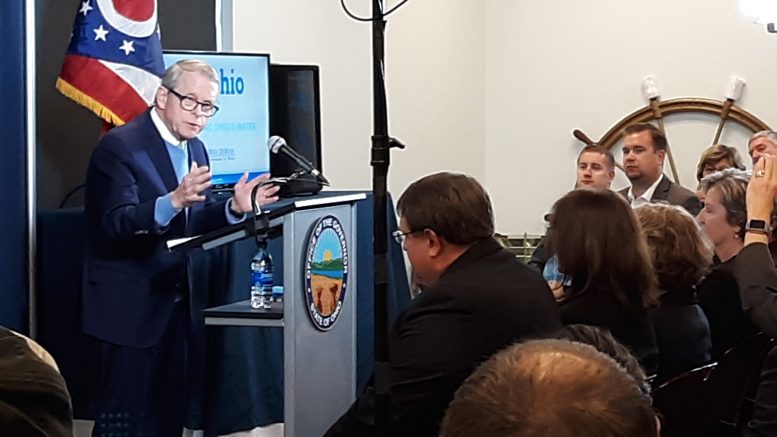The first clue came last Sunday evening.
“Big News OHIO,” State Rep. Nino Vitale posted to his Facebook page. “9 am Tomorrow Right Here.”
His large social media following got excited. Some thought Vitale was announcing a run for governor. Others presumed it had something to do with Gov. Mike DeWine; Vitale has been on the governor’s case for months with accusations of dictatorship and tyranny.
Those people were right. The next morning, Rep. John Becker, R-Union Twp., announced he would soon be introducing articles of impeachment against DeWine. Vitale and two other lawmakers — Candice Keller of Middletown and Paul Zeltwanger of Mason — quickly endorsed the plan.
Republican leaders were not pleased. Ohio Republican Party Chair Jane Murphy Timken called the impeachment effort “despicable” and “baseless.” Senate President Larry Obhof, R-Medina, characterized it as being political grandstanding. New Speaker of the House Bob Cupp, R-Lima, came out against impeachment as well.
Why go through the trouble if the articles of impeachment are DOA? Well, the four lawmakers involved have been among the biggest critics of DeWine and don’t have much to lose. Becker and Keller both lost primary elections in the spring and will be out of office soon. Vitale is running unopposed for his final two-year term; Zeltwanger is in a contested race for his final term, but his district is relatively safe.
The latter two are defenders of indicted former House Speaker Larry Householder, R-Glenford. When the vote went 90-0 to remove Householder as speaker last month, Vitale and Zeltwanger were among the few that abstained. Later that day, both voted for Householder ally Jim Butler, R-Oakwood, over Cupp to be the replacement speaker.
Several of the proposed articles of impeachment do in fact resemble critiques leveled against DeWine from the Republican caucus throughout 2020. To a certain degree, one could acknowledge that this impeachment quartet is willing to put their money where their mouths are.
But there is a big difference between criticizing the governor and endorsing an internecine effort to remove him from office.
DeWine, who has repeatedly welcomed constructive criticism throughout the pandemic, had two days to prepare for the inevitable question about impeachment at his Tuesday press conference.
“It’s a free country,” DeWine said about legislators spending their time on impeachment instead of tackling the virus.
“Have at it,” he concluded, a response befitting a governor with an approval rating in the 70s.
Republican state Rep. Rick Carfagna offered his own criticism of the impeachment effort in a lengthy, measured post to his official Facebook page.
Calling DeWine a “diligent and honorable man,” Carfagna said lawmakers could have disagreements with the governor without resorting to impeachment.

“I have not always agreed with the Governor’s orders or approach, but rather than posture across social media to impress others I’ve always chosen to express my disagreements constructively with the Administration in order to be taken seriously and influence actual change.”
Carfagna’s whole post is worth a read.
Now on to the mailbag…
Got a question about Ohio politics? Send them to tbuchanan@ohiocapitaljournal.com or tweet them to @tylerjoelb.
“Pennsylvania governor is pushing to legalize marijuana. Will we see similar movement in Ohio?”
Answer: From the sitting governor? No. But other Ohioans are still pushing for it.
For context, NPR reported earlier this week: “Pennsylvania Gov. Tom Wolf is asking state legislators to legalize recreational marijuana, saying the government could use the tax revenue to support small businesses and to fund restorative justice programs.”
The legalization is seen as a way to help the state economy as it recovers from the pandemic.
Gov. Mike DeWine has surprised a lot of Democrats this year with his (at times) proactive approach to handling the virus. But the governor coming out in favor of legalizing recreational marijuana would be a shock even for 2020 standards. Heck, even Joe Biden isn’t in favor of marijuana legalization.
Earlier this year, advocates hoped to get a constitutional amendment legalizing marijuana possession and consumption on the 2020 General Election ballot in Ohio. Organizers of the effort had trouble getting the ballot amendment language approved, though, and COVID-19 made collecting hundreds of thousands of petitions to secure its place on the ballot all but impossible.
It seems inevitable that future ballot efforts are on the horizon. And while the sitting governor may not be pushing for it, another familiar name in Ohio politics has emerged in recent years as a proponent of legalization: John Boehner.

There are a few marijuana-related bills kicking around in the Ohio House of Representatives, but there’s been little consideration given to them. Rep. Juanita Brent, D-Cleveland, sponsored a bill to decriminalize marijuana possession and trafficking. The bill would also vacate existing sentences and expunge such offenses from a person’s criminal record. Brent’s bill has been referred to the House Criminal Justice Committee, but it hasn’t received a hearing.
Brent and fellow Cleveland Democrat, Rep. Terrence Upchurch, have sponsored separate bills to expand use of medical marijuana for various health needs. Neither bill has received a committee hearing.
How can we get more political coverage on a local level? Most people overlook their local politics, state legislature, reps, etc. and follow only the big races.
Answer: Give me a minute while I climb up on this here soapbox.
By and large, news outlets throughout Ohio do a bang-up job covering their local issues: be it City Hall, the school board and what have you.
I’m going to be focusing primarily on the question of local outlets covering matters of state government and the legislature. That’s a much different issue.
Before covering politics and government for the Ohio Capital Journal, I spent over six years as a reporter and editor for two local newspapers in Southeast Ohio. In rural Vinton County, I edited a weekly paper that took hyper-local coverage to the extreme. Easter egg hunts, village mayor elections, sewer rate increases, Eagle Scout ceremonies, track and field competitions … we covered Vinton County, and Vinton County only.
Our coverage of state issues was rather sparse, unless something directly affected the county. State funding toward local parks would be an example, or a Department of Transportation highway project running through our area. One of our legislators at the time was Ryan Smith, who served as chairman of the Finance Committee. So we occasionally wrote about his efforts to direct funding back toward our area.
I later edited the 5-day-a-week newspaper in nearby Athens, a bit bigger community with a wider scope in coverage.
Notably, the Athens paper differs from the smaller Vinton County paper in that it utilizes The Associated Press wire service. AP reporters cover major stories throughout Ohio and distribute them to member news outlets for publication. This helped a lot for coverage of important topics such as higher education (Athens is home to Ohio University) or the biennial state budget negotiations.
For the most part, being the “paper of record,” we stuck with local issues: school updates, crime, etc.
Also present in Athens is an alternative newspaper, The Athens NEWS, which comparatively devotes more time to broader issues that still matter to local readers. I posed the question of state coverage in local media to Terry Smith, the longtime (and now retired) editor of the NEWS.
“(W)e always tried to cover the local or regional effects of statewide issues or races,” Smith told me. “So that meant in covering local environmental issues such as fracking, coal mining and clear-cutting, we had to address how state law or enforcement affected those issues. The same goes for non-environmental issues such as education, food insecurity and the opioid crisis … If there was a statewide issue such as redistricting or gay marriage, we’d try to find a way to localize the issue, usually by talking to local officials or public figures about the issue.”
“Localizing” a regional, state or national issue is bread and butter stuff for a community newsroom. The problem is it’s difficult to find the time.
Reporting coverage is a zero sum game. Every minute a reporter in St. Clairsville or Newark spends tracking down their legislator to talk public policy is a minute not spent covering the St. Clairsville school board or Newark city government. The hard truth is that newsrooms have to make decisions — cover this or that? — and should any editor eschew local coverage in favor of the latest gun control debate in Columbus, they’d have a slew of angry emails waiting for them the first thing each morning.
It isn’t as easy as just keeping reporters focused on local matters and leaving the state coverage to the wire services.
These services are like cable TV packages; you’re not just paying for the specific coverage topics you want. You get all the other random channels, too. It’s difficult to secure wire coverage of news, sports, entertainment and digital content without ponying up for a comprehensive package.
Trust me when I say it all adds up. Publishers face some tough decisions. Trim the wire service and there goes the Cincinnati Reds coverage. Angry calls. Stay pat on the wire service and cut a local reporter position, and there goes the school board coverage. Angry calls.
This is a good time to point out that Ohio Capital Journal content is, in contrast, free for all other media outlets to reproduce (with proper attribution). We aren’t a full substitute to the invaluable Associated Press, but there are many local newspapers, websites and radio/TV stations that could stand to benefit from running our stuff. Hint hint.
There are some consequences to media consolidation, but one benefit is the sister outlets can share content to one another. Gannett operates newspapers in big cities (Columbus, Cincinnati) and smaller communities (Coshocton, New Philadelphia). When the Columbus Dispatch team publishes the latest news on the Larry Householder scandal, Gannett papers throughout the state run that content. Local readers benefit greatly.
So … having provided all that context and inside baseball … what are the solutions?
For outlets:
- To the extent local newsrooms can, they should seek to provide original coverage of localized issues and electoral races.
- Those with access to wire services and OCJ content should continue to use this material and localize the coverage as much as possible. For example, a newsroom might run an Associated Press story about the latest bill passage, and throw in a quote from the local lawmaker or reaction from a local citizen/official.
For news consumers:
- Have some patience/empathy for the local outlets which are doing their best given the circumstances.
- Consider broadening your news consumption to include local outlets for local coverage and other outlets to get your regional and state news. Of course, I encourage you to sign up for the OCJ daily newsletter. But there are other newsrooms from all quadrants of Ohio providing this bigger picture coverage. The large newspapers feature websites with relatively cheap digital subscriptions. The state capital has several public radio and television stations covering these issues in an accessible way. There are plenty of options for you.
Reading material
Here are some important and interesting Ohio Capital Journal articles you may have missed:
Coronavirus cases down 31% in first month since mask mandate – Public health officials have stressed that wearing face coverings helps to slow the spread of COVID-19. A month after the governor mandated masks in public, the Ohio virus data is looking promising, Jake Zuckerman reports.
DeWine says his administration wants ideas about how to help distressed Ohioans – OCJ reporter Marty Schladen has doggedly covered the pandemic’s economic impacts on Ohioans, and this story outlines what the governor plans to do to help those still in need.
School funding bill to get new look under new speaker – What sorts of legislative priorities does new Speaker of the House Bob Cupp, R-Lima, have for the rest of 2020? Reporter Susan Tebben identifies one such priority: a school funding bill that just so happens to be originally sponsored by Cupp (alongside Democratic Rep. John Patterson of Jefferson).
Conservative lawmakers have spent the pandemic targeting DeWine. Now they want to impeach him – Earlier this week, a quartet of conservative lawmakers announced an effort to impeach the governor for his actions in responding to the coronavirus. While it is unlikely the rest of the GOP caucus will join them, I reported how the articles of impeachment resemble many of the criticisms leveled against DeWine this year.
***
Ohio Supreme Court: School district firearms policy can go on, pending appeal
The Ohio Supreme Court has said a school district can go ahead with a firearm policy for personnel while the state’s highest court decides on their case.
The Ohio Supreme Court granted Madison Local School District’s request to allow the implementation of a policy allowing trained personnel including teachers to be armed on school grounds Wednesday.
The amount of training the personnel must receive is still up for debate as the Ohio Senate considers a bill to lower that training level.
But just as they allowed the motion, they also sped up the schedule for their own deliberation.
“No stipulations or requests for extension of time shall be permitted, and the clerk of court shall refuse to file any stipulations or requests for extension of time,” the court said in a filing. READ MORE
Expert warns: Ohio Medicaid poised for big trouble
The Ohio Department of Medicaid is not being transparent about a process meant to bring transparency to the system by which the state buys billions of dollars worth of prescription drugs each year.
But what is becoming apparent as the agency belatedly follows a law requiring it to use just one pharmacy middleman, it’s actually hiring two.
That has a leading national expert and some Ohio lawmakers warning that the “fix” could end up costing taxpayers far more than the hundreds of millions of dollars in excess costs incurred under the existing system.
For its part, the Medicaid department is refusing to explain how or by whom the lion’s share of prescription-drug duties will be performed. READ MORE





